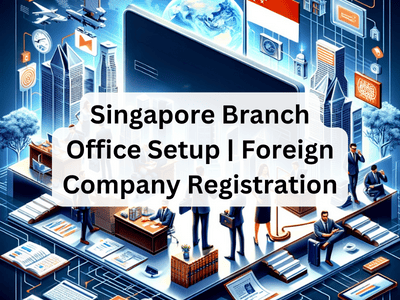Singapore Branch Office Setup | Foreign Company Registration in Singapore
 If you run a foreign company and wish to set up Singapore operations, you have three options:
If you run a foreign company and wish to set up Singapore operations, you have three options:
- A subsidiary
- A representative office
- A branch office
In this article, we are going to explain on how to set up a branch office in Singapore.
Note that most small and midsized foreign companies register subsidiaries in Singapore rather than setting up a branch office.
The preference for subsidiaries in Singapore could be because a branch office will have to fulfil the Continuing Compliance Obligations eg preparation of Financial Reports, Audit etc unless it qualifies and exemption criteria and exemption is granted. A branch office will be owned 100% by the head office, must file branch office’s as well as the parent company’s audit reports, will be taxed as a non-resident entity as local tax benefits are not available for branch offices, not qualify for group relief, cannot claim foreign tax credit, etc.
Due to the above reasons and the preference by clients to set up subsidiary companies rather than branch offices, we are no longer providing branch registration services to our clients.
To explore your other options, see foreign company set up options in Singapore.
A branch office must appoint at least one person living in Singapore to be its local authorised representative. The authorised representative has the responsibility of accepting notices on behalf of the branch office.
The directors and authorised representatives may report an alternate address with the Registrar. The alternate address must be located in the same jurisdiction as the individual’s residential address. Therefore if the officer is a local resident, his alternate address cannot be a foreign address. The alternate address cannot be a P.O. Box address and must be an address where the person can be contacted.
INFORMATION REQUIRED
You’ll need the following information to set up your Singapore branch office:
- Branch office name (must be the same as that of the parent company)
- Brief description of business activities
- Parent company’s financial year end
- A copy of Parent company’s latest financial statements – if the law for the time being applicable to the Parent company in the place of its incorporation or formation requires financial statements of the Parent company to be prepared
- A certified copy of the certificate of incorporation or registration in the place of incorporation or origin, or a document of a similar effect — must be certified by the Registrar of Companies, any other equivalent certifying authority or a Notary Public
- A certified copy of the parent company’s charter, statute or memorandum and articles or other instrument or documents defining its constitution — must be certified by the Registrar of Companies, any other equivalent certifying authority or a Notary Public
- A certified true copy of the current extract of the parent company’s particulars — must be certified by the Registrar of Companies, any other equivalent certifying authority or a Notary Public
- The list of the parent company’s directors and their personal particulars, i.e. passport number, residential address, nationality, date of birth, date of appointment as director of the foreign company. Download – List of Director
- The list must include directors residing in Singapore who are members of the local board of directors, if any and a memorandum duly executed by or on behalf of the foreign company stating the powers of the local directors, Download – Local Director
- A memorandum of appointment or power of attorney under the seal of the foreign company or executed on its behalf in such manner as to be binding on the company, stating the names and addresses of local authorised representative authorized to accept on its behalf service of process and any notices required to be served on the company. The memorandum of appointment or power of attorney must be verified and accompanied by a duly signed statutory declaration (for commonwealth countries) or affidavit (for non-commonwealth countries). Download – Statutory Declaration
- A minimum of one local authorised representative is required. Please provide us a copy of the local Singapore authorised representative NRIC with his/her contact information (telephone and email). If he/she is an Employment Pass holder, please provide his/her copy of passport, work pass, proof of residential address in Singapore. In addition, please provide us a copy of the memorandum of appointment of local authorised representative. Download – Branch Memo Appoint Local Agent.
- A Singapore registered office address (registered office address or physical office address), if any.
- A principal activities description (maximum of two activities) accompanied by the appropriate SSIC Code, if any. You can look up SSIC Codes at Search SSIC Code for Business Activity


